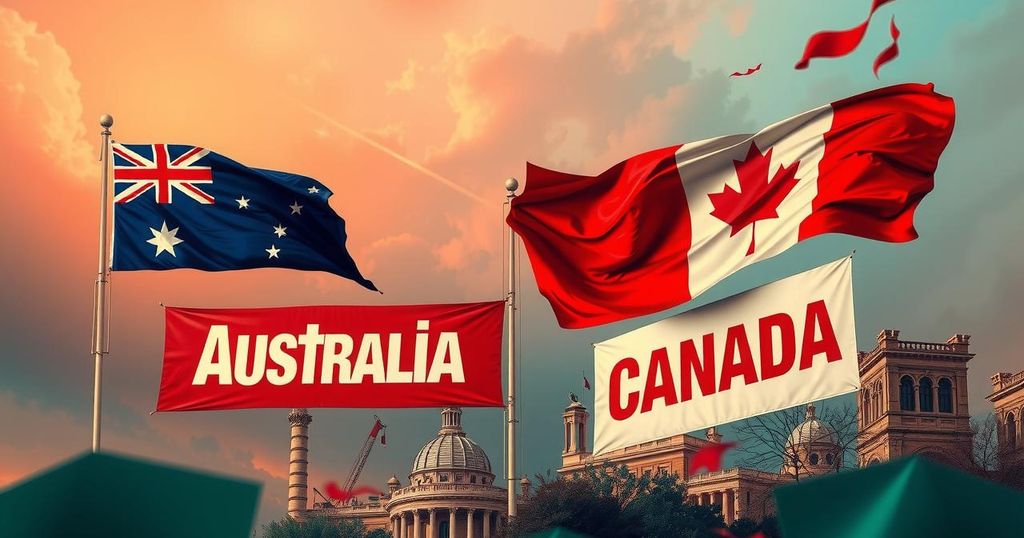In the upcoming elections in Australia and Canada, conservative parties have seen a surprising decline in polling, influenced by Donald Trump’s political actions. Analysts note that Trump’s break with political norms has impacted voter sentiment and party strategies, with mounting anti-Trump feelings complicating the electoral landscape for right-leaning candidates.
In the upcoming weeks, Australian and Canadian voters will cast their votes amid significant shifts in polling for opposition conservative parties. Initially expected to win, both Canada’s Conservatives, led by Pierre Poilievre, and Australia’s Liberals, led by Peter Dutton, have recently experienced dramatic declines, placing them behind their center-left counterparts. Ben Wellings, a senior lecturer in politics, notes the influence of Donald Trump’s political presence on these trends.
The polling falls in Australia and Canada were marked by pivotal moments. The Australian Coalition appeared to be gaining ground in late 2022 but faced a sudden downturn in February 2023, coinciding with Trump’s inauguration and the onset of his trade war against allies. In Canada, Conservatives led by Poilievre shifted from a commanding 20-point lead to a 6-point deficit due to mounting discontent with the Liberal Party over Trump’s actions.
Prime Minister Justin Trudeau’s strong stance against Trump’s trade tactics has resonated with Canadians, enhancing support for the Liberal Party. Newly appointed Prime Minister Mark Carney has maintained this tough discourse, further consolidating public backing. According to Clayton Chin, questioning national sovereignty has fundamentally altered the election’s dynamics, causing Poilievre to struggle for a quick pivot in strategy.
In Australia, Dutton faced backlash for praising Trump, while the Trump-like influence on his party was solidified when a senator promoted the phrase “Make Australia Great Again”. Political analysts have commented on the noticeable impact Trump has had on both conservative parties, but noted that the reaction in Canada has been particularly strong compared to Australia.
Antony Green, the ABC’s chief election analyst, observed that while conservative parties worldwide have adopted populist themes from the U.S., Trump’s presidency has led to a decline in the attractiveness of such populism. Recent polls indicate that many Australians view Trump’s influence unfavorably, with a significant percentage of undecided voters less likely to support Dutton due to Trump’s actions.
There is a widespread sentiment among Australians that questions U.S. reliability as a partner, mirroring concerns cited by certain respondents regarding their political leadership. As frustration grows over Trump’s influence, both countries reflect on their longstanding ties with the United States, fueling sentiments of betrayal.
Though polls might not always predict election outcomes accurately, some political strategists have begun assessing campaign failures, especially within Canada’s Conservative party. Kory Teneycke criticized the drastic shift in polling as a severe mismanagement of the political campaign, attributing it to Trump’s recent impact. Observers like Antony Green highlight the unusual nature of such polling turnarounds, emphasizing that these shifts are often catalyzed by significant external influences like Donald Trump.
The Australian and Canadian elections are significantly influenced by Donald Trump’s political activities, showing a marked polling decline for opposition conservative parties. As both countries grapple with the complexities of their relationship with the U.S., the prevailing anti-Trump sentiment reflects a broader political context. Despite uncertainties surrounding polling accuracy, the implications of Trump’s presidency resonate strongly, particularly within conservative political campaigns in both nations.
Original Source: www.abc.net.au






